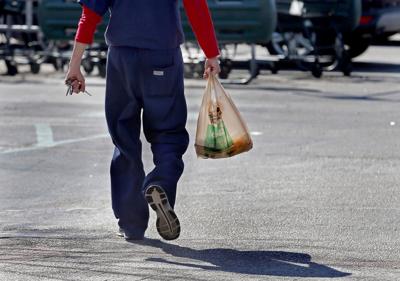COLUMBIA — New efforts to outlaw local bans on plastic bags and other single-use containers has reopened a passionate discussion between the plastic industry and state legislators who have championed such prohibitions, mostly in coastal regions.
A Senate bill that failed to pass last year was reintroduced this session and it not only would freeze future bans of plastic and foam bags, cups, bottles and other packaging but also would rescind any local laws already passed in several cities and counties.
The bill would only allow the General Assembly to regulate plastic bags and other single-use containers.
“We’re here to ask you to please respect our efforts, our intentions and our process in arriving in at the kind of ordinance that we did and to please respect our right of home rule,” Mount Pleasant Mayor Will Haynie said at a Senate hearing Wednesday.
Haynie said Mount Pleasant leaders met with fishermen, citizens and grocery store representatives before passing a ban on many single-use containers in April 2018. The law goes into effect next month.
Isle of Palms, Folly Beach, Hilton Head and the city of Charleston are among the other cities in the state who have halted the use of plastic bags in stores and restaurants, with Charleston’s ban extending to include plastic straws and foam containers.
The attempted ban on bag bans, sponsored by Sens. Scott Tolley, R-Spartanburg, and Wes Climer, R-Rock Hill, is supported by the plastic industry.
Matt Seaholm, executive director of the American Progressive Bag Alliance, an organization that represents the plastic bag manufacturing and recycling industry nationwide, said that Asia is responsible for the majority of plastic waste found in oceans and that South Carolina’s recent influx of plastic ordinances are “emotions based.”
“It might feel good (to pass) at the time but a patchwork of ordinances doesn’t work for anybody,” he said.
In addition to Haynie, the mayors of Charleston, Isle of Palms and Folly Beach — the first city in the state to ban plastic bags in 2016 — spoke at Wednesday’s meeting. They cited the seafood and tourism industries as would-be victims of the Statehouse bill, in addition to bringing up their looming environmental concerns.
“If a tourist is on a highway or town in the state and it doesn’t look so good, there’s a very slight chance that that tourist will be back anytime soon,” Folly Beach Mayor Tim Goodwin said. “If tourism is the goose that lays the golden egg in South Carolina, why would we kill that goose?”
The bill is awaiting another hearing before a Senate panel before moving forward. If it passes, opponents are wary that it could touch other areas of authority for local government.
“If the plastic bags issue is going to be the camel’s nose under the tent for the state to take over municipal regulations than it will be a very slippery slope from here,” Haynie said.








